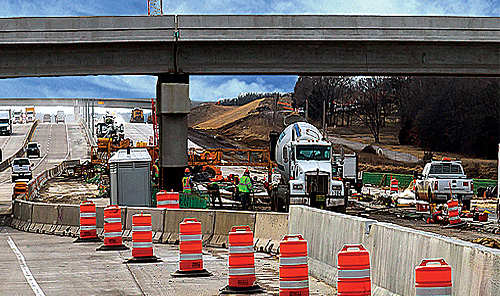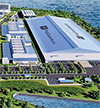Front Line: Infrastructure Upgrades Vital to U.S. Economy
A mediocre grade for U.S. infrastructure indicates there’s much work to be done to bring it up to the safe, sustainable level vitally needed for the supply chain and economic growth.
Q2 2021

It has been well-documented across the United States that years of neglect have resulted in roads and bridges in dire need of repair, outdated public transportation, subpar Internet service, and other critical infrastructure needs. In its most recent report card on the condition of America’s infrastructure, the American Society of Civil Engineers (ASCE) gave U.S. infrastructure a mediocre grade of C-. The engineers estimate it would cost $5.9 trillion over the next decade to bring roads, bridges, and airports to a safe and sustainable level. That’s about $2.6 trillion more than what government and the private sector already spend.
Ryan Severino, chief economist with JLL, said Biden’s bill “pointedly aims to improve aspects of infrastructure vital to the performance of the economy including tunnels, ports, rail, airports, water systems, the electrical grid, and high-speed broadband. Less conventionally, it also aims to improve the quality of buildings, including commercial real estate, upgrade the U.S. supply chain, invest in research and development, and provide job training for workers.”
Meeting the Needs of the Supply Chain
Although some percentage of the price tag would be funded by corporate tax increases, experts emphasize that repairing the national infrastructure — sooner rather than later — is imperative for the U.S. supply chain. Rich Thompson, global leader of Supply Chain and Logistics Solutions for JLL, told Area Development, “The supply chain community is super-excited; they’ve been concerned about infrastructure for quite a long time. Starting in the ’50s, the United States always had one of the most sought after logistics networks in terms of infrastructure…We’ve been the envy of the world. But, from time to time you have to remodel the house.”
In its most recent report card on the condition of America’s infrastructure, the American Society of Civil Engineers (ASCE) gave U.S. infrastructure a mediocre grade of C-. As a group, transportation providers are the most concerned about sub-par infrastructure, Thompson said, which “has an impact on corporations that are responsible for moving freight.” He calls port congestion “a major crisis – not as a direct result of infrastructure, as much as a bullwhip effect we’ve seen with the pandemic. We’ve got 30 to 40 ships in San Pedro Bay, waiting to get into L.A./Long Beach. Ultimately, when the pandemic subsides and the economy continues to grow, we expect all ships to rise with the tide. So it’s important for us to keep up with that…Ports are very demanding in terms of capital investments; you’ve seen what China has done. That’s needed here in the U.S,” he noted. For retailers in the age of Amazon, more than ever there is also a “need for speed,” which makes transportation infrastructure critically important.
Avoiding “Bridges to Nowhere”
Aaron Klein, a senior fellow at the Brookings Institution, told us that policymakers need to update their approach and focus on investing more wisely in improvements, and “avoid ‘bridges to nowhere.’”
Using gas tax revenue as the primary funding source for infrastructure funding “is based on the realities of an American economy from the last century,” he said, noting that Congress hasn’t raised the tax in 30 years. “We’re still investing in the idea that adding more highway lane miles will solve our congestion problem; it doesn’t work…We have a lot of potholes to fill before we build new things.”
While corporations typically consider tax increases a hindrance to prosperity, Klein said he hopes businesses will “take a long view of infrastructure investing, and not just focus on their next-quarter earnings.”
Project Announcements
Kimberly-Clark Expands Aiken County, South Carolina, Distribution Operations
05/04/2025
Aerowerks Plans Gaffney, South Carolina, Manufacturing Operations
05/04/2025
Sweden-Based Troax Group Plans Portland, Tennessee, Manufacturing Operations
05/04/2025
Kimberly-Clark Corporation Plans Warren, Ohio, Manufacturing Operations
05/04/2025
Denmark-Based Novonesis Expands Salem, Virginia, Production Operations
05/04/2025
Polyvlies USA Expands Winston-Salem, North Carolina, Manufacturing Operations
05/04/2025
Most Read
-
Run a Job Task Analysis
Q4 2024
-
39th Annual Corporate & 21st Annual Consultants Surveys: What Business Leaders and Consultants Are Saying About Site Selection
Q1 2025
-
The Location Economics of Advanced Nuclear
Q1 2025
-
Why Workforce Readiness Can’t Wait
Q1 2025
-
Power, Policy, and Site Selection in 2025
Q1 2025
-
Is It Time to Start Planning for Quantum Data Centers?
Q1 2025
-
Top States for Doing Business in 2024: A Continued Legacy of Excellence
Q3 2024



